My good friend Barry was kind enough to dig up some data from the night of the storm. To my mind it confirms what I believed I experienced that night. Thank you, Barry, for the help.
This chart is from a weather station on Bishops Head, very near to where I was anchored in Duck Point Cove. Measurements of wind direction, sustained wind and gusts are taken six minutes apart. The arrow indicates a 180 degree shift in wind within a six minute period (the wind could have taken the full six minutes to shift, or it could have happen much quicker than that, I don't know as I was sleeping). Wind speeds are in meters per second but I'll use a google converter to translate to miles per hour. Sustained winds prior to the shift were just over 8 mph. With the shift it increased to almost 15 mph, then within 12 minutes climbed to slightly over 25 mph (11.3 meters per second). Wind gusts were slightly under 15 mph prior to the shift, almost 20 after the shift and within 12 minutes up to over 40 mph (18 meters per second).
Obviously the anchor lost its hold on the bottom (even though I had pushed into the bottom during my afternoon swim). Maybe because of the nature of the bottom, clay and mud, it simply could not hold. My other thought is that with the very sudden 180 wind shift SPARTINA, with boom tent fully raised so there is a lot of surface area for the wind to catch, was blown over or very near the anchor and when the anchor line was pulled taught it simply yanked the plow anchor out of the bottom (the same way you would free an anchor by hoisting it vertically until it breaks free). I'll never know for sure.
The best think that happened that night is that I ended up against the marsh and dead trees. Had we been blown up against the riprap to the east I can only imagine SPARTINA would have been severely damaged or maybe even destroyed.
This other chart from Barry shows rapidly dropping temperature at top, rapidly increasing wind speed and, at bottom, sudden change in direction. The temperature graph interests me. I do not remember being cold in or out of the water. Maybe it was the adrenalin. I do remember thinking that night that hypothermia was my biggest risk. I have seen people become hypothermic. Once they cross that line they often cannot help themselves. I did try to keep aware of how I was feeling.
I did have the SPOT and personal locator beacon on the boat, easily reachable, but never considered for a second using either one. While SPARTINA was at risk of being damaged by pounding on the fallen trees, I never felt personally at risk. Worse case I could have easily pulled the bivy and sleeping bag out of the boat, climbed to a high spot in the marsh and waited out the night. The farm would have been in easy walking distance the next morning.
I mentioned that I had no perception of time or distance. I would have guessed that I had dragged SPARTINA the length of a football field - 300 feet - off the marsh. Using google earth and my GPS tracks I see now that I dragged her 964 feet - almost three football fields - out into deeper water.
I also see that while I thought I was pulling SPARTINA away from the marsh and to the west, I was really heading due north. The wind was out of the northeast so if the boat had dragged anchor again she would have just been pushed up against a muddy bank and her namesake cordgrass.
I was pleased that SPARTINA suffered only a few scrapes, damage so small that you would not notice unless you knew where to look. The sound of wood breaking must have been branches on the dead trees, the boomkin, mizzen boom, rudder, pintails and gudgeons were not damaged.
I admit also being pleased with how I handled the situation (though it would have been better to avoid the situation in the first place). I was calm and made good, practical decisions. I dragged SPARTINA three times, once to get her off the marsh, again after I had raised the mizzen and then the third time to deeper water. While hauling the boat away from shore I could not help but picture the cover of a book I had read decades ago. I knew when I read the book- it was a good tale - that it could not have been true. I have since read that much of what the author wrote, including his own name, was fiction. But the image did cause me to smile while out in the wind, waves and lightning.
Thanks for all the weather data, Barry.













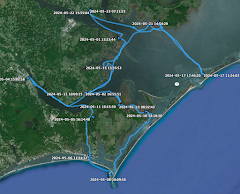
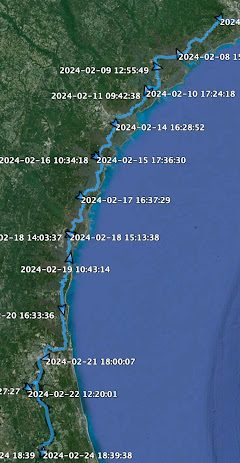

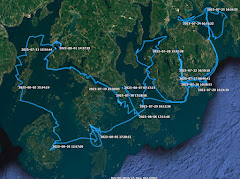

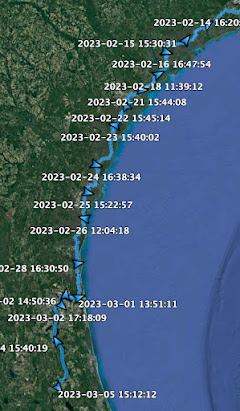

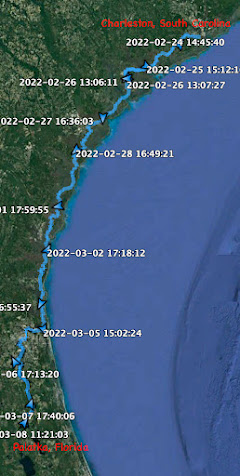
























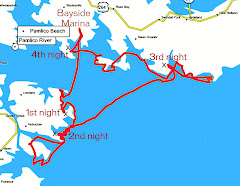


4 comments:
Steve:
Glad all worked for you on that hairy night. KMac, Kirk and I were anchored about 4 miles NW of you in Wheatley Point Cove that night and experienced the same weather, but no significant anchor dragging. We departed the following morning through Fishing Creek for Knapps Narrows and continued up the Bay to Chesapeake City. 5 of our 6 nights on the Bay were full of thunderstorms.
Yes, two nights later, I think it would have been Monday night, had the strongest wind of the storm anchored behind the spit at Tangier. Stormy week all around. steve
I'm sure the winds were every bit of 40 mph and wouldn't be surprised if some gusts were 50. We knew we would get a 180 degree change in wind direction but there really weren't any anchorages nearby with protection for that scenario so we just took our lumps.
I've spent several nights behind the sand spit at Tangier. Great protection from the South but roly in anything but dead calm conditions. Glad I wasn't there in a storm.
Steve, so glad to hear that you and the boat were unscathed--the riprap scenario is chilling. After just such a night over 15 years ago now, I changed over to the Bahamian Moor, using lightweight alloy anchors. Don't believe I could sleep now, anchored singly.
Post a Comment